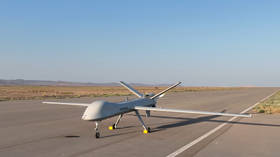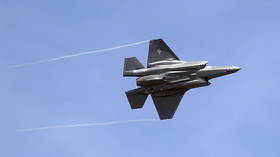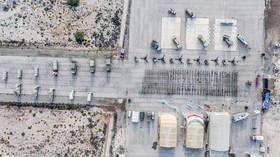
The new unmanned aerial vehicles are reported to have an operational radius of 2,000 kilometers (about 1,250 miles)

A newly unveiled Iranian drone, Mojaher-10. © AFP / Iranian Defense Ministry
The Iranian Defense Industry has unveiled the nation’s latest state-of-the-art, domestically produced drone, Mojaher-10, the national media reported on Tuesday. The unmanned aerial vehicle (UAV) was presented at a ceremony in Tehran attended by Iranian President Ebrahim Raisi.
According to Iranian media, Mohajer-10 can stay in the air for 24 hours and fly at an altitude of seven kilometers, or a little over four miles. The UAV has an operational weight of 300 kilograms (just over 660lbs) – three times as much as Iran’s previous drone of a similar design – Mohajer-6. The new drone has an operational radius of 2,000 kilometers, the reports say.
A video released by Iranian state media shows a UAV that bears some resemblance to the US MQ-9 Reaper drones. Footage shows the aircraft successfully taking off and landing on a runway. It also demonstrates several types of missiles and equipment it can carry. According to the video, up to three missiles can be placed under each of its wings.

Read more
The drone is equipped with electronic warfare and intelligence systems and can fly at the speed of 210 kilometers per hour (130mph), the Iranian media said.
The Iranian Defense Ministry said it was pursuing the development of what it called the fifth generation of strategic UAVs under its “drone leap” program. The project reportedly also involves developing the relevant software and artificial intelligence for the drones.
The announcement comes amid heightened tensions between Tehran and Washington, particularly in the Strait of Hormuz. In early August, Iran equipped its naval patrols in the area with drones and longer-range missiles.

Read more
The move came amid reports that the US military considered placing armed troops on commercial trips going through the strait. Last month, the Pentagon announced deployments of additional fighter jets and naval assets to the Persian Gulf in response to what it called “alarming events” in the area, including the seizure of commercial vessels by the Iranian military.
On Tuesday, Iranian Defense Minister Brigadier General Mohammad Reza Ashtiani said that the nation’s engineers also managed to reduce the Iranian ballistic missiles’ impact error to less than 35 meters and increase their range to 2,000 kilometers.
US-Iran tensions have risen since Washington pulled out of the Iran nuclear deal in 2018. Efforts to revive the agreement, known officially as the Joint Comprehensive Plan of Action (JCPOA), have failed, despite the change in US leadership when Joe Biden succeeded Donald Trump as president in January 2021.




